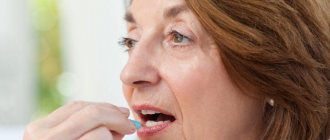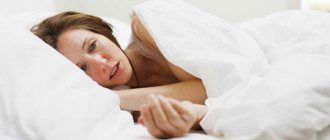During menopause, women often suffer from excessive sweating, frequent hot flashes, and general discomfort. How to get rid of these troubles, what are the reasons for their occurrence, what remedies exist for the treatment of hyperhidrosis, is described in our article.
What to do
What to do if you suffer from sweating during menopause? Many women are puzzled by this issue, because sweating causes a lot of inconvenience: it prevents normal communication, makes you nervous at a time when you want to be calm, and also causes insomnia and colds. Yes, all this is unpleasant, but not a reason for frustration. Any doctor will say so. Excessive sweating during menopause is a temporary phenomenon, and not every situation requires resorting to courses of therapy. First you just need to observe your condition.
The main problems that arise due to sweating are:
- Presence of odor. It causes discomfort to the woman herself and does not allow her to easily communicate with other people. Neither deodorants nor perfumes solve this problem.
- Irritation of the skin, mucous membranes and itching. Sometimes a rash may appear. Damaged areas of the skin and mucous membranes lose their tone and are more susceptible to various damages than ever.
- Problematic sleep, aggravating all the symptoms that accompany menopause. Women sweat the most at night, and they have to wake up every now and then, get into the shower and change clothes. But even in the mornings during menopause, excessive sweating occurs.
- Colds. As you know, during menopause, the immune system often becomes weaker, so women, after sweating, risk catching a cold.
How to recognize hot flashes during menopause
The average age of menopause for several centuries has been 51 years. For women who smoke, this figure drops to 46 years, for women with curvy figures it rises to 54 (fat tissue can produce additional estrogen). The blood supply system during this period is unstable, periodically the blood is actively directed to the upper half of the body, to the face. Due to uneven distribution, the body overheats. Hot flashes can be compared to inadequate physical activity, when blood pressure rises, pulse quickens, and shortness of breath appears. To normalize heat exchange, the body is forced to produce more sweat.
Unpredictable hot flashes are accompanied by various symptoms:
- Redness of the skin, especially the facial part;
- A rush of hot waves to the upper body;
- Increased heart rate;
- Changes in blood pressure;
- Increased sweating;
- Chills (after body hypothermia);
- Dry mucous surface.
9 out of 10 mature women complain of hot flashes. The picture is completed by weight gain for no apparent reason, fatigue, nervousness, unstable emotional background, and loss of interest in sex. Unmotivated aggression naturally provokes the activity of sweat fat centers, so the skin surface is often covered with a layer of sweat. This, at first glance, cosmetic problem does not just cause discomfort, forming new inferiority complexes. The pungent smell of sweat is often impossible to overcome with either deodorant or perfume, not to mention the characteristic marks on clothes. Because of wet clothes, it is easy to catch a cold, because the immune defense is no longer the same. Alternating bouts of fever and chills impair the quality of sleep. If hygiene procedures are not enough, irritation, rashes, and diaper rash appear on the skin.
How to get rid
Many women during menopause suffer from sweating, but they do not know how to get rid of it. To get rid of excessive sweating, a woman will have to make serious changes to her lifestyle, get rid of bad habits and, if possible, the reasons that caused this condition.
It is necessary to cleanse your diet of harmful foods and drinks that irritate the nervous system. Their place should be taken by a sufficient amount of fiber that can replenish the body with important minerals and vitamins.
If a woman smokes, then it is better for her to give up this harmful habit. Nicotine is known to have detrimental effects on blood vessels, which affect the central nervous system, brain, and sweat glands. Women who smoke are much more likely to suffer from sweating during hot flashes.
Movement is life, as they say, and it is true. You can do swimming, gymnastics, cycling or just brisk walking. This will help normalize disrupted hormonal levels, as well as increase the level of endorphins, and as a result, insomnia and mood swings will gradually disappear. Although hot flashes will remain, they will occur much less frequently, and sweating will decrease.
Controlling your own weight is another important point during menopause. If you have extra pounds, it is recommended to lose weight not abruptly, but gradually. Under no circumstances should fasting be allowed. Some women lose weight when they go through menopause. It is very important to take vitamin complexes to maintain normal hormonal levels.
While at home, you should ventilate the rooms more often, and it is advisable to do this also before going to bed. And outside the home you should avoid stuffy rooms. Clothing should be made of natural fabric, loose, and appropriate for the weather.
Video
We offer you to watch a video on the topic of the article.
Education: Rostov State Medical University, specialty “General Medicine”.
Found an error in the text? Select it and press Ctrl + Enter.
In the UK there is a law according to which a surgeon can refuse to perform an operation on a patient if he smokes or is overweight. A person must give up bad habits, and then, perhaps, he will not need surgical intervention.
The cough medicine “Terpinkod” is one of the top sellers, not at all because of its medicinal properties.
Our kidneys are capable of purifying three liters of blood in one minute.
A person taking antidepressants will, in most cases, become depressed again. If a person has coped with depression on his own, he has every chance to forget about this condition forever.
Four pieces of dark chocolate contain about two hundred calories. So if you don’t want to gain weight, it’s better not to eat more than two slices a day.
It was previously believed that yawning enriches the body with oxygen. However, this opinion has been refuted. Scientists have proven that yawning cools the brain and improves its performance.
You are more likely to break your neck if you fall off a donkey than if you fall off a horse. Just don't try to refute this statement.
According to WHO research, talking on a mobile phone for half an hour every day increases the likelihood of developing a brain tumor by 40%.
Over the course of a lifetime, the average person produces no less than two large pools of saliva.
When we sneeze, our body stops working completely. Even the heart stops.
Millions of bacteria are born, live and die in our intestines. They can only be seen under high magnification, but if they were put together, they would fit in a regular coffee cup.
The average life expectancy of left-handers is shorter than that of right-handers.
Even if a person's heart does not beat, he can still live for a long period of time, as the Norwegian fisherman Jan Revsdal demonstrated to us. His “engine” stopped for 4 hours after a fisherman got lost and fell asleep in the snow.
When lovers kiss, each of them loses 6.4 calories per minute, but at the same time they exchange almost 300 types of different bacteria.
According to statistics, on Mondays the risk of back injuries increases by 25%, and the risk of a heart attack by 33%. Be careful.
The recovery period after any surgical intervention requires the patient to be extremely careful about his health. But what to do if you need to...
Anti-sweating tablets during menopause
When a woman’s reproductive function gradually declines, she experiences menopause, which affects the quality of life and causes a number of unpleasant symptoms.
The age range from 45 to 55 years is considered to be the onset of menopause in women. The ovaries stop producing estrogen and its content in the female body gradually decreases. There comes a time of big changes in the hormonal background, accompanied by unpleasant symptoms that ruin a woman’s life. In this situation, a woman will need the help of pills.
All medications that can alleviate the symptoms of menopause are divided into three groups:
- Hormonal, containing estrogen and progesterone, designed to compensate for their deficiency in the female body. They help eliminate hot flashes, sweating, mood swings, and premature skin aging. The effect of taking them is noticeable almost immediately.
- Non-hormonal (supplements) - tablets consisting of herbal components. They have a soft, but not fast effect. The result becomes noticeable only after three weeks. There are no contraindications to taking them, but you will have to be patient to cure menopause.
- Sedative tablets, which have a calming effect, normalize the functioning of the nervous system. Thanks to them, it is possible to get rid of attacks of aggression and anger, irritability, and also improve sleep.
Tablets and capsules are indicated if a woman experiences:
- Frequent hot flashes, excessive sweating, worse at night and during stress,
- Increased nervousness, irritability, depression, panic attacks,
- Sleep problems
- Dryness in the vagina due to the fact that natural discharge is too scanty,
- Pain while emptying the bladder
- Feeling of discomfort during intimacy, decreased sexual desire,
- Hair loss, brittle nails and premature aging of the skin.
In some cases, menopause can be especially difficult, and a woman may develop hypertension, heart rhythm disturbances, or osteoporosis (bones are too fragile). You will need to undergo a course of treatment with properly selected medications. And it will be very good if the doctor selects them, because then the woman will be able to avoid serious complications.
Tips and tricks
Useful tips to help you achieve greater benefits from therapy:
- Try to avoid stressful situations that affect the general psycho-emotional state and cause increased sweating.
- Be as physically active as possible - it is recommended to play sports at least 3 times a week, and physical activity should be evenly distributed.
- Reduce the consumption of foods that have an adverse effect on the nervous system - strong coffee, alcoholic drinks, and spicy seasonings.
- Try to watch your weight, as extra pounds can cause increased sweating.
- Take properly selected vitamin complexes. After the onset of menopause, the female body, more than ever, needs additional support in the form of vitamins and minerals, which can significantly normalize overall hormonal levels.
Compliance with these recommendations together with the use of folk remedies will have a positive effect in alleviating menopause.
Drugs
There are a lot of medications available for menopause. And they have proven themselves best:
- Szigetin. Hormonal drug in the form of tablets of domestic production. It is intended to eliminate mild disorders during menopause. The course of treatment is a month, take half a tablet or a whole tablet in the mornings and evenings.
- Femoston. Also a hormonal drug containing estrogen and progesterone. It helps women feel better by reducing sweating, hot flashes, headaches, agitation, vaginal dryness, and preventing the development of osteoporosis. It is recommended to start taking pills on certain days, taking into account the menstrual cycle. And if menstruation no longer comes, then from the day on which they should have started.
- Angelique. Hormonal drug, excellent for continuous hormone replacement therapy. Tablets are taken to get rid of hot flashes, normalize the emotional state of women, and also improve their condition in general. Just take the pills continuously; when one package runs out, you need to stock up on the next one in advance. Taken once a day in tablets at the same time.
- Remens. Homeopathic remedy for menopause. In a short period of time, it relieves the unpleasant symptoms of menopause and returns hormonal levels to normal.
Methods to get rid of excess sweating
There are many ways to get rid of sweating during menopause. Complex therapy is usually used, including taking medications, using traditional recipes, and changing lifestyle.
Through complex treatment, the main factors that cause menopausal sweating can be eliminated:
- effects of stress;
- pathological processes in the nervous system, manifested by emotional outbursts;
- overweight;
- metabolic disorder;
- changes in hormonal levels.
To improve health and cope with the symptoms of menopause, women need to eat right. To reduce sweating, you should exclude tonic foods from your diet: coffee, spices and herbs, alcoholic drinks, cigarettes.
Also, a decrease in sweating is associated with an active lifestyle. Elderly women are recommended to engage in light physical exercise, gymnastics, Nordic walking, cycling, and walking daily.
Folk remedies
By changing your lifestyle, you can supplement the fight against excessive sweating with various folk remedies. However, before you start using herbal decoctions and infusions, it would be useful to ask your doctor whether the chosen plant will have a detrimental effect on sex hormones in the female body and whether it will cause allergies.
You can take note of the following folk remedies:
- A decoction of rosemary leaves. Take leaves (1 tbsp) and pour boiling water (250 ml) over them. Boil in a steam bath for 15 minutes, then strain. Consume 2 tbsp half an hour before meals three times a day. L.
- Sage tea. Take the herb (2 tbsp) and pour boiling water (200 ml) over it. Leave for an hour for the mixture to infuse thoroughly. Use three times a day. Thanks to this infusion, the sweat glands will be “pacified” a little, and you yourself will calm down a little.
- Herbal collection. Take blueberries and sage in equal proportions, as well as clover and marsh grass in half the amount. Mix well. Scoop 1 tbsp. Once collected, pour boiling water (200 ml) into it and leave to steep for two hours. The infusion must be drunk within 6 hours.
- Chamomile-oak bath. As you know, oak bark contains tannins that help reduce the activity of sweat glands. And chamomile is an excellent antiseptic that suppresses the activity of microbes and a sedative.
Night sweats
If a woman can somehow cope with the sensations of heat in the chest, neck and face during the day, then at night it is more difficult to correct such conditions. A woman experiences a hormonal storm in the form of alternating waves of sweating and chills for 9-16 months. The fact that these phenomena are harmless and temporary is of little comfort, because adequate sleep is the key to good health.
A woman does not always feel hot flashes in her sleep; most often she wakes up from chills, after she has sweated. If such hot flashes occur regularly, you can only dream of normal sleep. Memory and concentration deteriorate, libido decreases. External signs of menopause increase emotional instability: the appearance of unwanted facial hair, weight gain, snoring, hair loss, thinning of the skin and mucous membranes of the urethra and vagina. If measures are not taken to stabilize the condition, the consequences can be more serious:
- The functioning of the immune system deteriorates;
- The heart and blood vessels suffer;
- The level of “bad” cholesterol and blood sugar – precursors of diabetes mellitus – increases;
- Reduced muscle tone and bone density (osteoporosis);
- Obesity and chronic depression are added;
- The risk of malignant neoplasms increases.
The conclusions, of course, are generalized; each woman’s symptoms manifest themselves individually. But even one of these consequences, for example, an increased risk of stroke or heart attack, should be a reason for urgent consultation with a cardiologist.
Causes of hot flashes and heavy sweating
Menopause is a time when a woman has to get used to living in a different rhythm, because from that moment her beauty gradually fades, and she no longer feels as strong as before. In addition, the woman suffers from hot flashes and sweating.
What are the reasons for excessive sweating? There are several of them:
- You have to put more effort into moving and doing work,
- A woman has chronic fatigue
- Stuffy room, hot weather,
- Too strong emotions
- Taking a hot bath, visiting a sauna or bathhouse,
- Eating spicy and too hot food,
- Following a diet that is very low in protein
- Addiction to smoking and alcohol,
- Clothes that are not suitable for the weather, made from artificial fabric and tight,
- Taking antidepressants or weight loss medications.
Causes of menopause
During the development of menopause, the reproductive system mainly changes. Under the influence of hormones, various changes in the body occur. On the part of sexual function, follicles stop developing, eggs that carry the ovulation function stop maturing, and there is a general decrease in the entire internal secretion of the ovaries.
The hypothalamic-pituitary system is completely rebuilt. In the ovaries, the follicles are replaced by tissue made from connective cells. Such actions lead to a decrease in the size of the ovaries and their wrinkling. Sclerosis of ovarian tissue occurs.
The amount of main hormones involved in the normal functioning of the entire reproductive system gradually increases, and the production of estrogen decreases.
Is it worth taking products with phytohormones?
During menopause, women are prescribed different types of medications. Now doctors are increasingly prescribing synthetic estrogen analogues to their patients, but they have a disadvantage in the form of side effects. Therefore, an excellent alternative during menopause are phytohormones, which do not harm the body.
Not every woman decides to take hormonal therapy, because it is possible to start taking them only after a complete examination and constantly take breaks. As for herbal preparations, they may be inferior to hormonal ones in terms of the speed of onset of effect, but there are no time restrictions on their use. And the only contraindication is individual intolerance to the components of the drug.
Popular phytohormones are:
- Climatoplan. The drug is in the form of tablets with sepia, black cohosh extract and sanguinaria in the composition. Helps reduce the symptoms of menopause, since it has an estrogen-like effect on the woman’s body.
- Qi-clim. In pharmacies you can see it in the form of tablets and cream. The drug is an estrogen substitute. It has general strengthening properties and reduces the number of hot flashes.
- Estravel. Dietary supplement in capsule form with nettle, wild yam extract, diosgenin and isoflavones.
- Clymandion. It comes in the form of tablets and drops. Contains black cohosh extract as the main active ingredient. The drug helps normalize blood circulation, improve sleep, and alleviate hot flashes.
Medicines against excessive sweating
If sweating is very severe during menopause and postmenopause, or serious problems with women's health are noted, then you should consult a doctor. A medical specialist will recommend medications that help with sweating and reduce the symptoms of menopause.
The list of drugs used for hyperhidrosis includes:
- Hormonal medications
. Doctors prescribe them to patients most often. These drugs, based on synthetic estrogens - female sex hormones, have a strong positive effect on the body and eliminate menopausal symptoms caused by estrogen deficiency. - Blood pressure-lowering drugs
. Vasodilators are prescribed, with the help of which blood pressure is normalized and sweating disappears. - Antidepressants
. Necessary for normalizing mental and emotional state, restoring the nervous system. - Mild sedatives
. They have a calming effect. Helps fight sleep problems.
Some of the best drugs for getting rid of sweating during menopause include:
- Persen
to eliminate tachycardia, normalize the functioning of the nervous system; - Novo-Passit
for sweating, headaches, shortness of breath, dizziness, sleep disturbances, depression; - Cliophyte
, which has a calming effect, normalizes sleep, eliminates dizziness and other menopausal symptoms; - Lerivon
, which relieves depression and restores sleep.
What examinations will you need to undergo?
When a woman begins menopause, she definitely needs to visit a specialist - a gynecologist or gynecologist-endocrinologist. If you first go to a therapist, he will collect anamnesis and then refer you to the right specialist.
The woman will be assigned:
- Blood test (FSH and estradiol are especially important),
- Urinalysis (FSH and LH are important).
In addition, the doctor may refer you to:
- Histology of the uterine mucosa,
- Vaginal smears
- Ultrasound of the genital organs,
- Mammography.
There is no need to regret the time spent on the examination, since it will allow you to exclude diseases, the occurrence of which is provoked by changes in hormonal levels. Each woman experiences menopause differently: one hardly notices it, but another feels so bad that she needs medical help.
Diagnosis of hyperhidrosis
To determine the cause of the disease and associate it with menopause, other options should be excluded. These may include thyroid disease, panic attacks, early ovarian atrophy, prolactin tumor and others.
To diagnose them, blood and urine tests will be needed. You will also need to have appointments with specialist doctors: endocrinologist, neurologist, cardiologist, gynecologist.
To diagnose hyperhidrosis and exclude non-menopausal causes, the following tests are needed:
- Luteinizing hormone (LH), which is elevated during menopause;
- Estradiol, which, on the contrary, is reduced;
- Levels of follicle-stimulating hormone (FSH) in the blood and urine;
- Ultrasound of the pelvic organs;
- Mammography;
- Vaginal smears and histology of the uterine mucosa;
- Recording changes in body temperature.
Since excessive sweating can be caused not only by menopause, just as the symptoms of menopause can be characteristic not only of the corresponding age stage, you should consult a doctor at the first doubt about your health. Otherwise, this may lead to undesirable consequences.
Reviews
Dear readers, your opinion is very important to us - therefore, we will be glad to hear your feedback about sweating during menopause in the comments, this will also be useful to other users of the site.
Rita
I went through menopause two years ago, and I couldn’t even imagine how difficult this period in life was. Yes, the sweating is terrible, but the problems don’t end there. This is a series of changing ebbs and flows, constant irritability and even at night no peace. I was told that it is necessary to maintain a balance of minerals and vitamins in my body. Complexes containing soy isoflavonoids give a good effect. But first I’m going to see a gynecologist and endocrinologist. They will definitely tell you something.
Antonina
I’m also going through menopause now, but I can’t say that I’ve started sweating heavily. But my mother was diagnosed with hyperhidrosis during menopause. They recommended that she take homeopathic drops and apply Formagel once a week to get rid of sweat and the smell of it. Over time, everything returned to normal and my mother felt much better; her body probably adapted to the new state.
Prevention
For the purpose of prevention, as well as for treatment, lifestyle should be optimized. First of all, you should consult a doctor for preventive consultation and routine tests that will show all the risks and the need for treatment.
It is also important to minimize stress associated with work, family, and everyday life. Perhaps a change of job or even leaving the household will help, or perhaps a move will be required. Moderate physical activity can increase endurance and in the future will allow you to sweat only under much greater stress than without training.
A vegetarian or similar diet can also help prevent the development of hyperhidrosis and other unpleasant symptoms of menopause. Thus, it is recommended to consume legumes and cereals, replace animal fats with vegetable oils (you can leave it in the diet or add fatty fish to it). Cabbage, flax and sesame seeds, spinach, asparagus, carrots and garlic improve digestion and prevent gastrointestinal problems, which can also include sweating and body odor. Red grapes improve the functioning of the cardiovascular system, which means it reduces the body’s need to remove excess fluid through sweat. It is better not to throw away grape seeds, as they contain the highest concentration of nutrients. Corn, oats and rye, wheat sprouts will also be useful.
Vitamin and mineral supplements and other dietary supplements can help prevent, delay, or relieve future menopausal symptoms, including sweating. As with treatment, B vitamins (B6, B12), vitamin D and calcium, magnesium will help. Also, external intake of phytoestrogens, such as soy isoflavones, compensates for the lack of estrogen production with age. Therefore, you can use the dietary supplement Flavia Night during menopause both to help in treatment and to help in prevention.
A competent approach to prevention and treatment, a timely visit to the doctor and qualitative lifestyle changes can not only alleviate hot flashes during menopause and hyperhidrosis, but also help get rid of them completely. All it takes is effort. And doctors, physical education, phytoestrogens and vitamins will help you with this.
Causes of unpleasant odor
9 out of 10 women experience hot flashes during menopause. These are conditions associated with sudden fever, increased blood pressure (pressure), dry genital mucosa, and increased sweating. The reason for this is a decrease in the production of estrogen and progesterone by the ovaries and adrenal glands.
In addition to hormonal imbalance, the unpleasant smell of sweat during menopause occurs as a result of:
- metabolic disorders due to a decrease in estrogen, an unstable balance of alkaline and acidic environments, causing dry skin and changes in body odor during menopause;
- obesity - women who are overweight produce more fluid than other representatives of the fair sex;
- neurological diseases - stress, increased nervous excitability lead to sweating, accompanied by an unpleasant odor;
- consumption of foods containing food additives and dyes, excess coffee, very fatty and sweet foods;
- bad habits, such as smoking and alcohol abuse during menopause, increase the production of sweat with an unpleasant odor;
- aging of the body - it is more difficult for a woman over 45-50 years old to perform daily physical activity, which significantly increases sweating;
- warm season - in the summer a person sweats more, moisture is not absorbed, the glands become clogged, leading to the proliferation of bacteria and the appearance of an unpleasant odor;
- violation of the body's introductory balance - during menopause it is very important to consume at least 1.5 liters of water per day for the normal functioning of all internal organs and systems;
- weight loss pills - cause hot flashes and sweat with an unpleasant odor;
- synthetic clothing impedes air movement, increases moisture production, and provokes the appearance of a bad skin odor;
- endocrinological diseases such as diabetes and hypoglycemia, accompanied by metabolic disorders, provoke severe hot flashes and sweat;
- oncology, the stage of metastasis formation causes feverish conditions accompanied by sweating;
- viral diseases: acute respiratory viral infections, influenza, sore throat, tuberculosis, which are characterized by high body temperature, chills, and heavy sweating.
Personal hygiene rules
To prevent increased sweating from becoming the cause of inferiority complexes, it is important to pay maximum attention to your appearance:
- Take a shower as many times a day as your skin requires - pores clogged with dirt and oil prevent your skin from breathing. Do not experiment with new hygiene products every day - use only proven ones.
- The same recommendations apply to hair. With age, they become thinner, dry and brittle, and therefore require increased attention.
- A contrast shower will help restore thermoregulation. In order not to provoke insomnia, it is better to use this method in the morning.
- If you experience excessive night sweats, bedding, even cotton, should be changed as often as possible. Plus keep another set in stock nearby.
- Use deodorants and antiperspirants. Your doctor will help you choose your type (depending on the degree of menopause).
A woman at any age should remain successful, beautiful, charming and desirable. Follow these tips and be happy.
Source
Surgical intervention
Many cosmetic clinics offer their services to perform a special operation called “Curettage,” which allows you to destroy the sweat glands in the armpit area. After such an intervention, the woman begins to sweat less. The procedure is quite effective, but does not exclude the occurrence of side effects:
- allergic reaction to anesthesia;
- the occurrence of compensatory hyperhidrosis in other areas;
- the appearance of edema and hematomas;
- loss of skin sensitivity.
Know! Surgical interventions can also include botulinum toxin injection. As a result of its implementation, the nerve impulse that goes to the sweat gland is blocked.
How to deal with sweating during menopause
Hormonal changes in a woman’s body through the department that controls temperature are somehow related to body temperature. Unfortunately, the mechanism that has been fine-tuned over many years eventually ceases to function. It is surprising that body temperature does not increase significantly at the time of high tide. The tides are synchronized in time with the temperature of the internal organs, and its changes are subject to the daily cycle. The maximum is recorded in the afternoon or early evening, and hot flashes are observed at any time of the day. The good news is that the frequency of hot flashes decreases over time. Over the 4 years after menopause, the number of hot flashes in the control group decreased by 20%. Sweating during menopause is not only a treatment with medications. With an integrated approach, you can get good results without drugs.
Deep breathing technique
Professor Robert Friedman (USA) recommends relieving symptoms with deep breathing. His study involved women who had up to 20 hot flashes per day.
After mastering the deep breathing technique, the frequency of attacks was halved.
In the first phase of the tide, the central nervous system is maximally active; deep breathing in this case suppresses it, reducing the risk of new attacks. At the first sign of a rush, you should try to breathe deeper. To do this, you need to take a comfortable position: sit down, relax your abdominal muscles. Start by exhaling, which in this case should be longer than usual. Then inhale slowly, controlling the tone of the relaxed abdominal muscles. Continue the exercise until the attack ends.











